¡Tu carrito actualmente está vacío!

8 Top Slang Dictionary Picks
Decoding the World of Slang
Ever struggled to understand local lingo while traveling or felt lost in a conversation peppered with unfamiliar slang? This listicle presents a curated selection of top-tier slang dictionaries to help you decipher the ever-changing world of informal language. Discover online and app-based resources for interpreting slang from around the globe, including dedicated slang dictionaries like Urban Dictionary and Slangit, alongside established dictionaries with robust slang sections like Dictionary.com and TheFreeDictionary. Whether you’re a student, a global traveler, or simply a slang aficionado, these tools will empower you to understand and even use slang with confidence.
1. Slang Dictionary Around the World
Dive headfirst into the vibrant world of global slang with Slang Dictionary Around the World. This comprehensive slang dictionary isn’t just a list of words; it’s a cultural passport. It offers a deep dive into the informal language of numerous regions, from the cheeky banter of British pubs to the colorful jargon of Japanese streets, the laid-back lingo of Australia, and the expressive street language of Mexico. This resource meticulously curates entries with precise definitions, real-world examples, and insightful cultural context, transforming language learning into a captivating exploration of global communication.
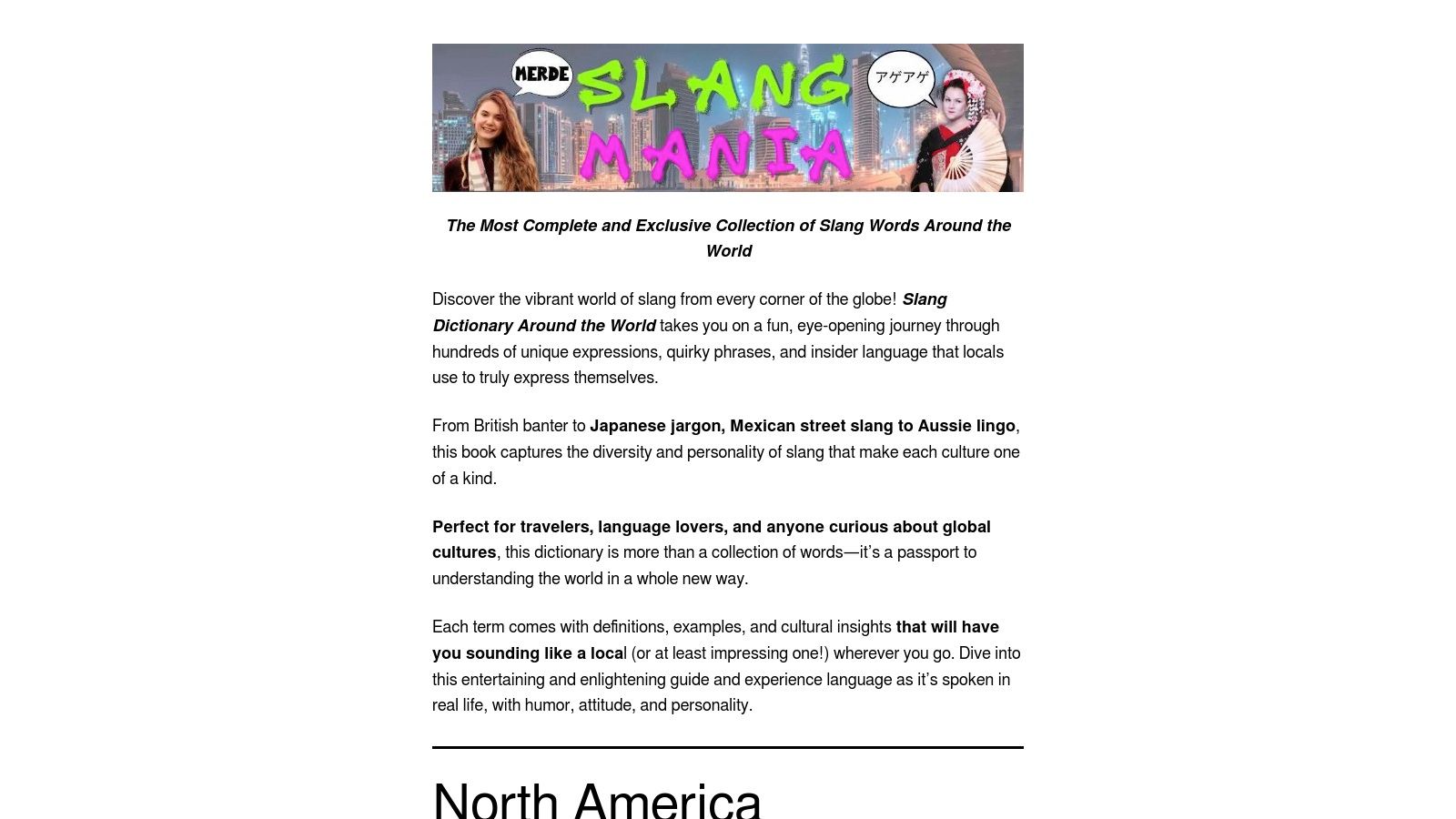
This slang dictionary earns its top spot on our list because it fills a crucial gap for anyone seeking authentic communication experiences. Imagine navigating the bustling markets of Marrakech and understanding the local haggling tactics, or effortlessly joining a conversation in a Tokyo izakaya. This dictionary empowers you to move beyond textbook phrases and connect with people on a deeper level. Whether you’re a seasoned globetrotter, a language enthusiast eager to expand your vocabulary, a student delving into sociolinguistics, or simply curious about the nuances of global dialects, this tool provides invaluable insights. You can Learn more about Slang Dictionary Around the World and explore its comprehensive features.
For travelers, it’s an invaluable tool for avoiding embarrassing faux pas and truly immersing themselves in the local culture. For language learners, it adds a vibrant layer of understanding beyond formal grammar and vocabulary. Students and academics can utilize this resource to research linguistic trends and the evolution of language within different cultures. Even slang aficionados will appreciate the breadth and depth of this comprehensive collection.
Features and Benefits:
- Comprehensive Global Coverage: Unlike many slang dictionaries that focus on a single region or language, this resource offers a broad spectrum of slang from around the world.
- Accurate Definitions and Cultural Context: Each entry provides not only a clear definition but also the cultural context surrounding the slang term, explaining its origin, usage, and social implications.
- Real-World Examples: Understand how slang is used in everyday conversations through authentic examples, aiding comprehension and practical application.
- Immersive Learning Experience: The combination of definitions, cultural context, and examples transforms learning slang from rote memorization into a dynamic and engaging experience.
Pros:
- Offers comprehensive, global coverage of unique slang from multiple regions.
- Provides accurate definitions and cultural context for real-world usage.
- Ideal for travelers, language enthusiasts, and cultural explorers.
- Transforms language learning into an entertaining and immersive adventure.
Cons:
- The extensive range of slang expressions may be overwhelming for absolute beginners.
- Primarily focuses on informal language, which might not suit formal study needs.
Website: https://slangmania.com
While pricing and specific technical requirements are not currently available, the website suggests ongoing development and potential future resources. Compared to other slang resources that often focus on a single language or region, the global scope of this dictionary makes it a unique and valuable tool for anyone interested in understanding the intricacies of language and culture worldwide. It’s an essential companion for navigating the ever-evolving landscape of global communication.
2. Urban Dictionary: The Crowdsourced Slang Dictionary
Urban Dictionary is a cornerstone resource for anyone navigating the ever-evolving landscape of modern slang. Founded in 1999, this crowdsourced online slang dictionary has become a go-to platform for understanding contemporary language, internet terminology, and cultural references that often bypass traditional dictionaries. Its dynamic nature, fueled by user contributions, makes it invaluable for deciphering the latest lingo, whether you’re a global traveler trying to understand local idioms, a language enthusiast keeping up with new expressions, or a student researching the nuances of online communication. Urban Dictionary’s unique approach to lexicography allows it to capture the pulse of how language is actually used, offering a raw and unfiltered glimpse into how words and phrases evolve in real-time.
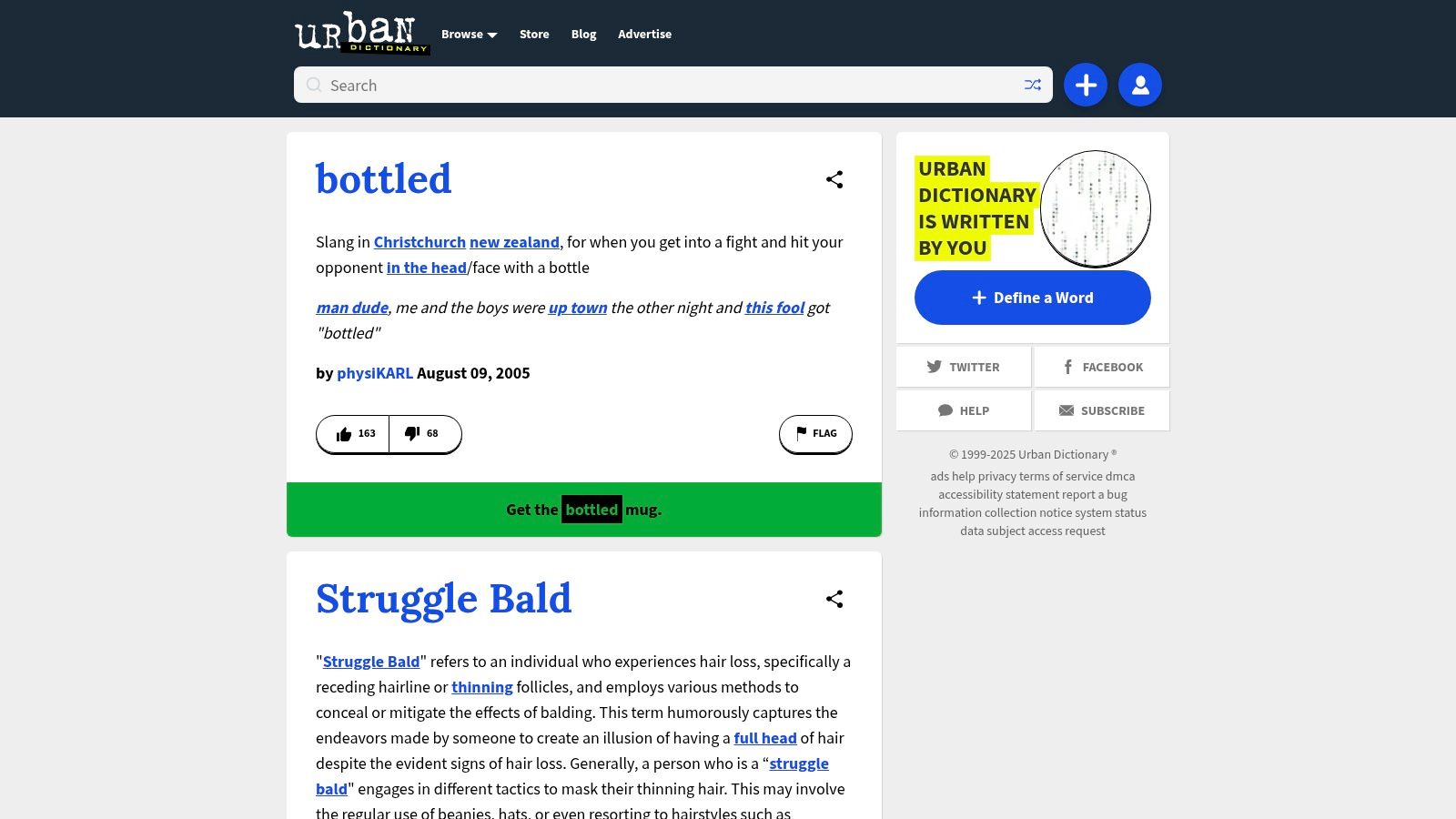
One of the most compelling features of Urban Dictionary is its user-submitted definitions. This democratic approach allows the platform to stay remarkably up-to-date, with new terms and expressions constantly being added. The community voting system allows users to upvote the most accurate and helpful definitions, ensuring that the most relevant interpretations rise to the top. Beyond simple definitions, Urban Dictionary often provides multiple entries for a single term, reflecting the nuances of meaning across different contexts and subcultures. This multifaceted approach is especially useful for slang, where the same word can have drastically different connotations depending on the situation. Furthermore, the platform offers a “Word of the Day” feature, introducing users to new and interesting slang on a daily basis.
For those constantly on the move, Urban Dictionary offers convenient mobile apps for both iOS and Android, making it easy to look up unfamiliar terms wherever you are. Its robust search functionality, complete with autocomplete, streamlines the process of finding the information you need. The platform also displays related terms and examples of usage, providing further context and enriching your understanding of the slang in question.
While Urban Dictionary’s comprehensive nature and community-driven approach are its greatest strengths, it’s crucial to be aware of its limitations. Because the content is largely unmoderated, some definitions may contain offensive material, biased interpretations, or simply be inaccurate. The platform also features heavy advertising, which can be distracting. For these reasons, Urban Dictionary may not be suitable for all educational environments. It’s crucial to use it with a discerning eye, cross-referencing information with other sources when necessary.
Pricing and Technical Requirements: Urban Dictionary is free to use and access via its website https://www.urbandictionary.com/. The mobile apps are also free to download and use. Accessing the platform requires an internet connection.
Comparison and Implementation Tips: While other slang dictionaries exist, Urban Dictionary’s sheer breadth of content and its up-to-the-minute updates set it apart. For a more curated experience, consider consulting traditional dictionaries that include slang sections, but understand these may not be as comprehensive or current. When using Urban Dictionary, it’s advisable to read multiple definitions and consider the voting scores to get a well-rounded understanding of a term. Be mindful of the potential for offensive content and use your own judgment. For slang aficionados, cultural explorers, and anyone navigating the complexities of online communication, Urban Dictionary is an essential, albeit imperfect, tool.
3. Slangit
Navigating the ever-evolving landscape of online slang can be challenging. Slangit offers a lifeline, serving as a dedicated online slang dictionary specifically geared towards internet slang, text message abbreviations, and acronyms. This focus makes it incredibly useful for understanding modern digital communication. Whether you’re a parent trying to decipher your teenager’s texts, an educator adapting to student language, or simply someone trying to keep up with the latest online trends, Slangit provides a clear, concise, and family-friendly resource. It cuts through the noise and confusion, offering straightforward definitions without the crude content often found on other slang resources. This characteristic alone makes Slangit deserve its place on this list of top slang dictionaries.
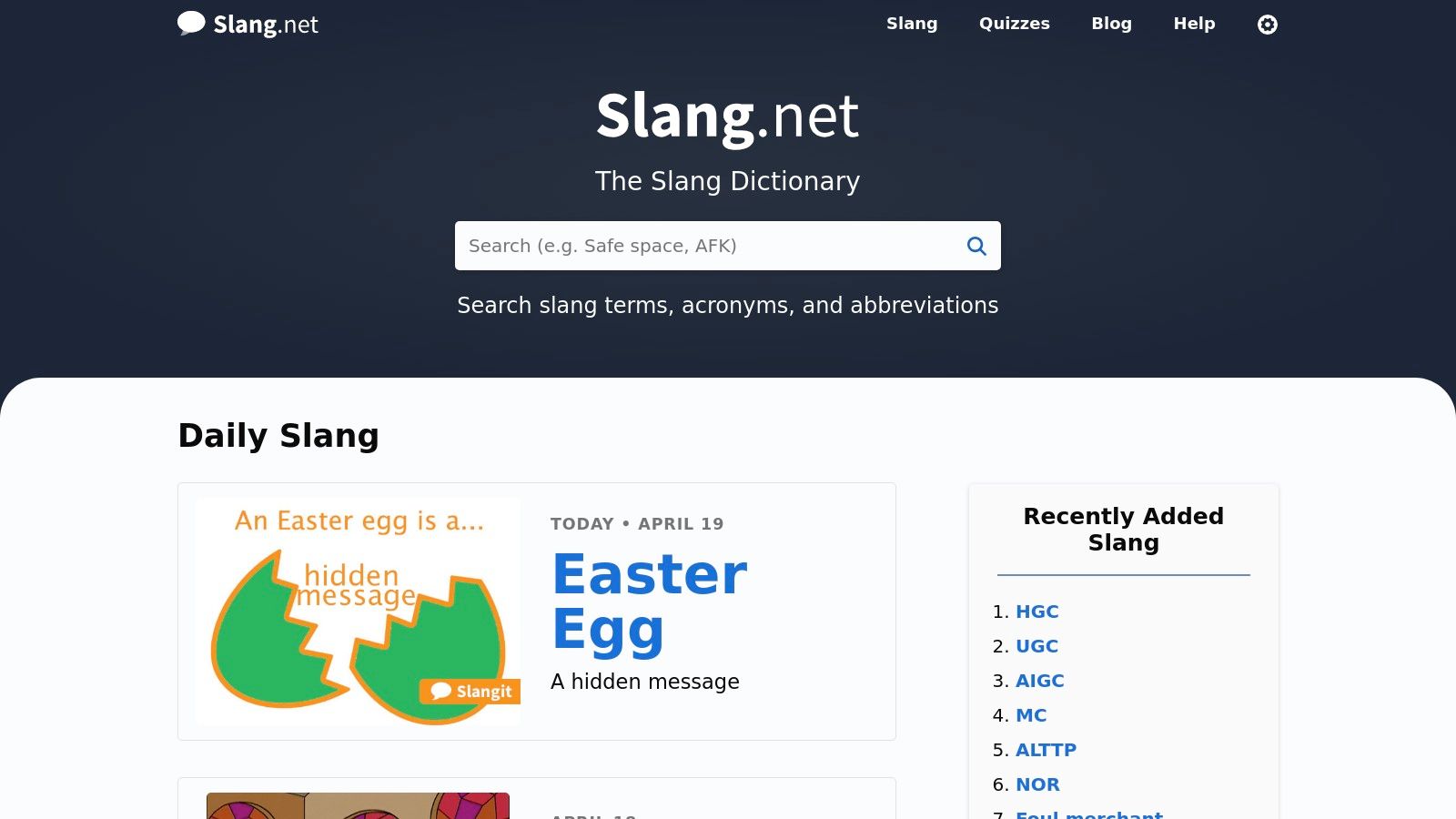
One of Slangit’s key strengths lies in its organization. Slang terms are categorized by context, such as texting, gaming, and social media, making it easy to find exactly what you’re looking for. This categorized approach is particularly helpful for those trying to understand slang within a specific online community. Imagine trying to understand gaming terminology; Slangit allows you to dive straight into that category. The platform also boasts daily slang term updates, ensuring you stay up-to-date with the latest lingo. Furthermore, a convenient browser extension enables instant lookups while browsing the web – eliminating the need to constantly switch tabs. For offline access, Slangit offers printable slang cheat sheets, perfect for quick reference.
Compared to more comprehensive slang dictionaries, Slangit might fall short in terms of sheer volume of entries. It focuses primarily on internet and texting slang, with fewer entries covering cultural or regional variations. Additionally, Slangit has limited community engagement features. While this maintains the clean and moderated environment, it does mean fewer opportunities for user-generated content and discussions.
Features:
- Clean, moderated definitions of internet slang
- Categorized slang (texting, gaming, social media)
- Daily slang term updates
- Browser extension for instant lookups
- Printable slang cheat sheets
Pros:
- Family-friendly content moderation
- Clear, straightforward definitions
- Excellent for understanding texting and chat abbreviations
- Well-organized categories
Cons:
- Less comprehensive than some competitors
- Fewer cultural or regional slang terms
- Limited community engagement features
Website: https://slangit.com/
Slangit offers a streamlined and accessible approach to understanding modern slang. Its curated and moderated content makes it a valuable tool for anyone navigating the complexities of online communication, particularly in educational and family settings. While it may not be the most exhaustive slang dictionary available, its focused approach, user-friendly features, and commitment to clean content make it a strong contender for those seeking a reliable and accessible slang resource.
4. The Online Slang Dictionary
For those seeking a deep dive into the world of slang, The Online Slang Dictionary stands out as a valuable resource. Established in 1996, it boasts the title of the oldest slang dictionary on the web, offering a structured and academic approach that sets it apart from more contemporary, crowd-sourced alternatives. This slang dictionary isn’t just a list of terms; it’s a historical record, tracing the evolution of language and providing insights into the cultural contexts that shape slang. This makes it particularly useful for academics, language enthusiasts, and anyone interested in the history of language.
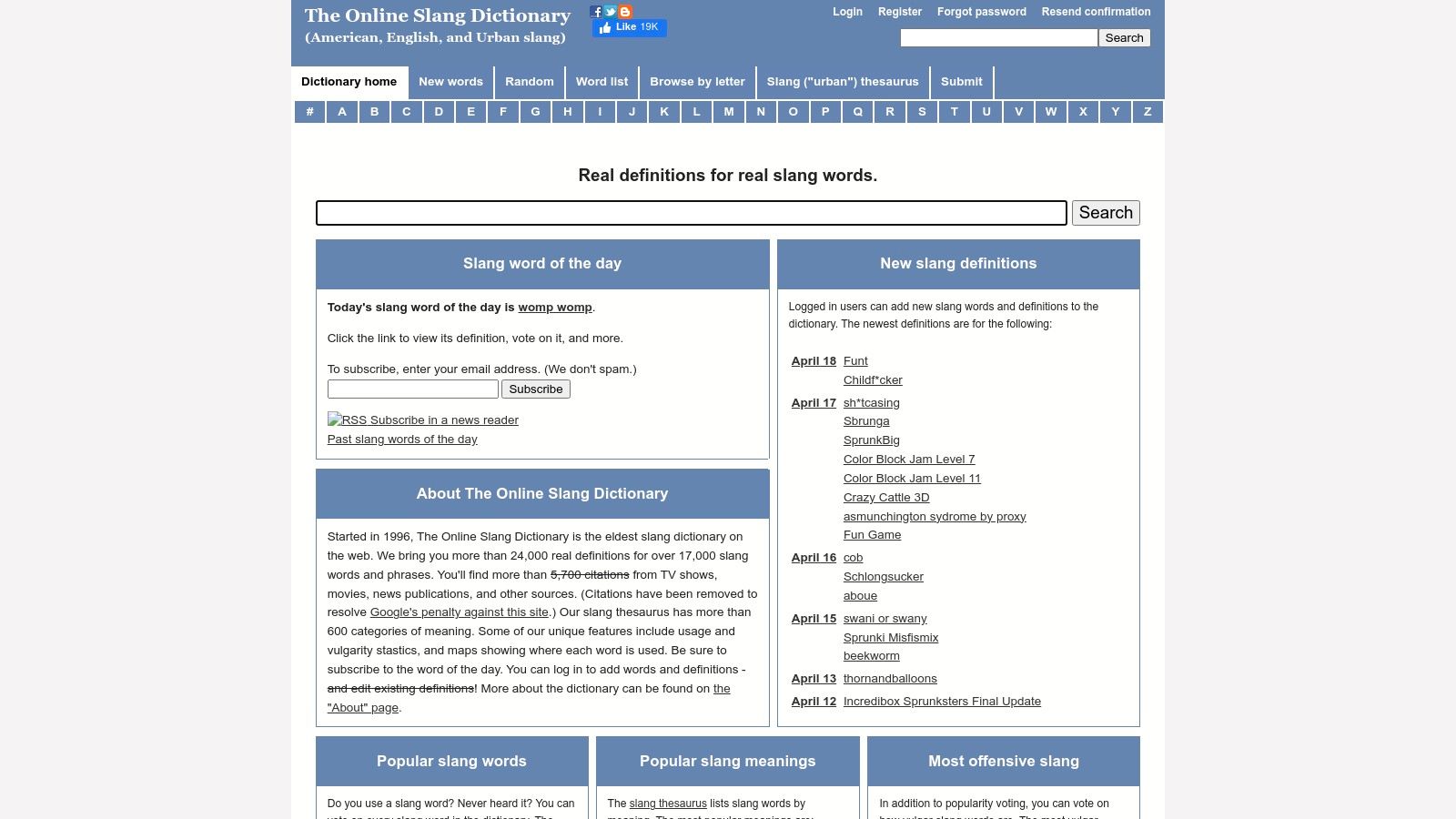
This slang dictionary covers American, English, and urban slang, providing not only definitions and usage examples, but also crucial details like regional variations, age and gender demographics associated with each term, and even a vulgarity rating system. Imagine preparing for a trip to a new region; The Online Slang Dictionary can equip you with the local lingo, helping you avoid misunderstandings and blend in more easily. For students and academics studying linguistics or cultural trends, the features offered here are invaluable. The geographic tagging of slang origins allows researchers to track the spread and evolution of terms, providing a rich dataset for linguistic analysis. Features like pronunciation guides and historical tracking of slang evolution further enhance its academic value. You can even delve deeper into the website via their sitemap if you Learn more about The Online Slang Dictionary.
While other slang dictionaries might be quicker to add the very latest slang terms, The Online Slang Dictionary prioritizes a more thorough, academic approach. This means providing detailed linguistic insights and ensuring accuracy through community ratings, which some newer platforms lack. This focus on quality over quantity makes it a reliable source for serious research and study.
Pros:
- Academic approach with linguistic insights: Offers more than just definitions; provides context, etymology, and usage patterns.
- Regional information: Helps understand the geographic origins and spread of slang terms.
- Longevity provides historical perspective: Tracks the evolution of slang over time.
- Community ratings for accuracy: Ensures reliability and keeps definitions up-to-date.
Cons:
- Less intuitive interface than modern competitors: May not be as visually appealing or easy to navigate as some newer platforms.
- Slower to add very recent slang terms: Focuses on established slang rather than the constantly evolving cutting edge.
- Smaller database than some other platforms: Prioritizes depth and accuracy over sheer volume of terms.
Website: http://onlineslangdictionary.com/
The Online Slang Dictionary earns its place on this list because it fills a specific niche: providing a scholarly and comprehensive resource for understanding slang. While it might not be the best choice for someone looking for the absolute latest TikTok trends, it is an indispensable tool for anyone interested in the deeper cultural and linguistic significance of slang. Its historical perspective, regional information, and academic rigor make it a unique and valuable slang dictionary for language enthusiasts, cultural explorers, and researchers alike.
5. Dictionary.com Slang Dictionary
Dictionary.com’s Slang Dictionary stands out as a reliable and authoritative resource for deciphering the ever-evolving world of slang. It bridges the gap between traditional lexicography and contemporary language, offering a valuable tool for anyone navigating the nuances of informal English. This slang dictionary is particularly useful for global travelers, language enthusiasts, cultural explorers, students and academics, and slang aficionados seeking accurate and contextualized definitions. Whether you’re trying to understand the latest internet slang, deciphering a text message, or simply expanding your vocabulary, Dictionary.com’s Slang Dictionary offers a robust and accessible platform for understanding slang in its various forms.
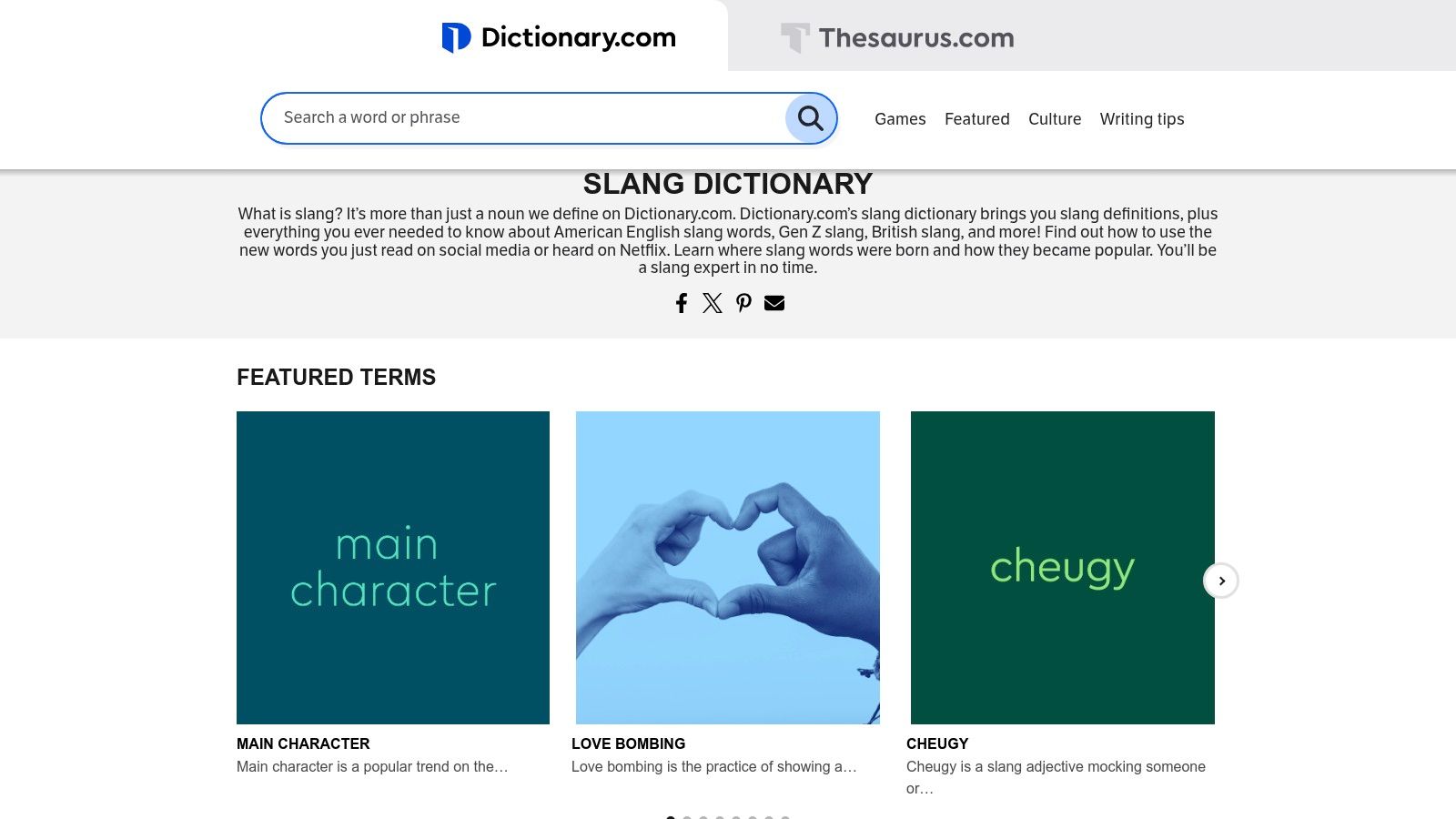
Unlike crowdsourced slang dictionaries, Dictionary.com employs professional lexicographers who meticulously research and verify the definitions provided. This ensures high-quality, accurate information, including etymological details and usage guidance. This rigorous approach makes it a trusted source for academic research, language learning, and understanding cultural context. Furthermore, its integration with the main Dictionary.com platform provides seamless access to a wealth of additional linguistic resources, including a thesaurus, grammar guides, and educational content. You can easily switch between looking up standard English words and exploring their slang counterparts, offering a holistic approach to language learning.
The platform boasts a clean, ad-light interface that prioritizes user experience. Features like audio pronunciations help users grasp the correct pronunciation of slang terms, an invaluable asset for language learners. The “trending slang” section keeps you updated on the latest buzzwords and popular expressions, allowing you to stay current with the ever-changing landscape of informal language. While a free version provides access to core features, a paid subscription unlocks additional benefits, such as ad-free browsing and advanced search functionalities. However, even with the free version, Dictionary.com’s Slang Dictionary remains a valuable resource for navigating the intricacies of slang.
While Dictionary.com excels in providing reliable definitions and cultural context, it may not be as comprehensive as some crowdsourced platforms when it comes to very recent or niche internet slang. Its focus on verified information means that newer terms might take some time to be added to the database. Similarly, highly specialized slang used within specific online communities may be less represented. Despite these minor limitations, the depth of information, focus on quality, and integration with a wider range of linguistic resources makes Dictionary.com’s Slang Dictionary a valuable tool for anyone seeking to understand and navigate the dynamic world of slang. You can access this slang dictionary directly at https://www.dictionary.com/e/slang/. It’s a useful addition to any language enthusiast’s toolkit.
6. Slang Dictionary App by TheFreeDictionary
Looking for a handy slang dictionary that fits in your pocket? The Slang Dictionary app by TheFreeDictionary is a strong contender for anyone who needs quick access to slang definitions, whether you’re a global traveler navigating unfamiliar lingo, a language enthusiast expanding your vocabulary, or simply a curious cultural explorer. This mobile app, created by Farlex, the same company behind the reputable TheFreeDictionary website, offers a comprehensive collection of slang terms and idioms, making it a valuable tool for understanding informal language.
This app earns its place on this list due to its convenient mobile focus, combining a comprehensive database with offline functionality. Imagine being in a foreign country, overhearing a slang term, and being able to instantly look it up, even without internet access – this app makes it possible. This offline access is a major advantage, especially for travelers and students who may not always have reliable connectivity.
The Slang Dictionary app boasts a user-friendly interface designed specifically for mobile devices. Key features include:
- Offline access to slang definitions: Consult the dictionary anytime, anywhere, even without an internet connection. This is particularly beneficial for travelers in areas with limited connectivity.
- Audio pronunciations: Hear how slang terms are pronounced, helping you understand and use them correctly. This feature is invaluable for language learners.
- Favorites and history tracking: Save frequently searched terms for easy access and review your search history to reinforce learning.
- Word of the Day notifications: Expand your slang vocabulary passively with daily notifications introducing new terms.
- Integration with TheFreeDictionary’s other language tools: Seamlessly access other language resources offered by TheFreeDictionary, expanding the app’s utility beyond just slang.
Pros:
- Excellent mobile user experience: The app is designed for intuitive navigation on mobile devices.
- Works without internet connection: Access definitions offline, a crucial feature for travelers and students.
- Cross-referenced with idioms and phrases: Gain a deeper understanding of slang by exploring related expressions.
- Regular content updates: The slang database is regularly updated to reflect evolving language.
Cons:
- Full features require in-app purchases: While the basic functionality is free, unlocking all features, including audio pronunciations, may require a purchase. The pricing model isn’t explicitly detailed on their website and may vary depending on the platform.
- Less community engagement than web-based platforms: Unlike some web-based slang dictionaries, this app doesn’t have a strong community aspect for user contributions or discussions.
- Some interface limitations compared to dedicated websites: The smaller screen size of mobile devices can sometimes limit the amount of information displayed compared to a website.
Implementation and Setup Tips:
Simply download the “Slang Dictionary App by TheFreeDictionary” from your device’s app store (iOS or Android). After installation, you can immediately start searching for slang terms. Consider exploring the settings to personalize your experience, such as enabling Word of the Day notifications.
Comparison with Similar Tools: While other slang dictionaries exist, this app distinguishes itself through its robust offline functionality and integration with a broader suite of language tools. This makes it a more versatile option than simple online slang dictionaries, particularly for offline use.
This app is a valuable tool for anyone who wants to stay on top of current slang or decipher unfamiliar terms, especially those who frequently travel or engage with diverse language communities. For language learners, slang dictionaries like this complement traditional dictionaries by offering insight into informal language use, bridging the gap between textbook knowledge and real-world conversations. Download the app from https://www.thefreedictionary.com/app.htm and unlock a world of slang at your fingertips.
7. Green’s Dictionary of Slang Online
For serious slang enthusiasts, language researchers, and historical linguists, Green’s Dictionary of Slang Online stands as the ultimate resource. This digital edition of Jonathon Green’s monumental work offers an unparalleled exploration into the historical evolution of slang, making it a unique and invaluable slang dictionary. It’s not just a list of words and definitions; it’s a meticulously researched chronicle of language evolution. If you’re looking to understand the rich history behind a slang term, its origins, and how its meaning has shifted across centuries, this is your go-to source.
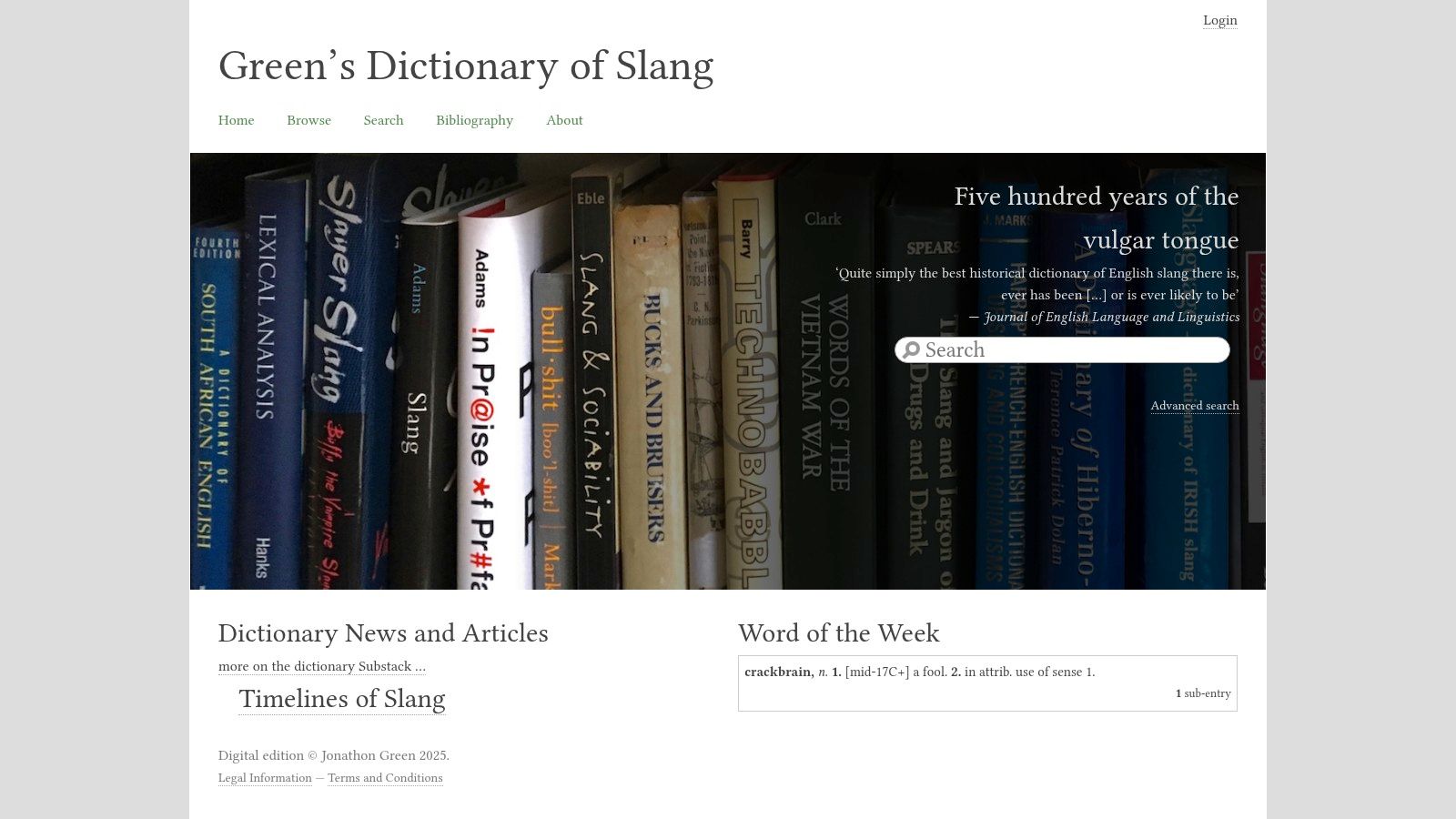
Green’s Dictionary of Slang Online boasts over 53,000 slang terms and a staggering 130,000+ citations, providing unparalleled depth. Each entry offers historical dating of first usage, etymological tracing, and documented development with scholarly citations and references. Chronological listings showcase the term’s evolution, providing valuable context for how slang changes over time. This academic rigor makes it a crucial tool for researchers and a fascinating resource for anyone interested in the history of language.
While other slang dictionaries might focus on contemporary usage, Green’s sets itself apart with its historical focus. For instance, if you’re a cultural explorer researching the slang used in Victorian England or a student analyzing the linguistic evolution of a specific term, Green’s provides the historical context missing in modern slang resources. This extensive archive makes it far more than a simple slang dictionary; it’s a treasure trove of linguistic history.
The comprehensive nature of Green’s makes it particularly useful for specific use cases. Global travelers interested in the nuances of language will appreciate the historical background of terms. Language enthusiasts and cultural explorers can delve deep into the evolution of language, exploring how social and historical contexts influence slang. Students and academics can utilize the robust citations and references in their research, relying on the dictionary’s lexicographical excellence. And, of course, slang aficionados will be in absolute heaven. Learn more about Green’s Dictionary of Slang Online for a comprehensive understanding of its features.
While full access requires a subscription, the limited free access provides a taste of the dictionary’s vast resources. Its academic approach, while a strength, can be less intuitive for quick, casual lookups. Additionally, the dictionary prioritizes historical depth, meaning coverage of very recent internet slang may be less comprehensive than in other dictionaries. This trade-off prioritizes quality historical research over fleeting internet trends.
Pros:
- Unmatched historical depth and academic rigor.
- Detailed evolution of slang terms over time.
- Citations and verifiable sources for all entries.
- Professional lexicographical standards.
Cons:
- Limited free access (full access requires subscription).
- Less coverage of very recent internet slang.
- Academic approach may be overwhelming for casual users.
- Less intuitive for quick lookups.
Website: https://greensdictofslang.com/
Green’s Dictionary of Slang Online earns its place on this list by offering something truly unique: an unparalleled journey through the history of slang. Its depth of research, historical accuracy, and scholarly approach make it an indispensable resource for anyone seeking a deep understanding of slang and its evolution. While its academic nature and subscription model may not suit all users, for those pursuing serious linguistic exploration, Green’s is in a class of its own.
8. WordSense Slang Dictionary
WordSense Slang Dictionary earns its spot on this list thanks to its unique multilingual approach to slang. While many slang dictionaries focus on a single language, WordSense opens up a world of colloquialisms, offering translations and equivalents across numerous languages. This feature makes it an invaluable slang dictionary for global travelers, language enthusiasts, cultural explorers, students, academics, and anyone fascinated by the ever-evolving nature of language. Whether you’re trying to decipher a French idiom, understand the nuances of Mexican slang, or simply curious about how a particular slang term translates across different cultures, WordSense offers a fascinating glimpse into the global landscape of informal language.
One of the primary benefits of WordSense is its utility for translators and language learners. Imagine grappling with a text riddled with slang and needing to find not just the meaning, but the equivalent expression in another language. WordSense tackles this challenge head-on, providing cross-referenced terms between languages and illustrating their usage with example sentences. This contextual information helps ensure accurate and nuanced translations, moving beyond literal meanings to capture the true essence of the slang. The inclusion of etymological information adds another layer of depth, allowing users to explore the origins and evolution of slang terms, making it a powerful tool for academic research and linguistic exploration.
Beyond simple translations, WordSense connects related expressions and synonyms, painting a fuller picture of how slang fits within a language’s lexicon. This makes it an excellent resource for writers looking to add color and authenticity to their work, or for anyone wanting to deepen their understanding of a particular language and culture. Whether you’re a student studying abroad, a businessperson navigating international communications, or simply a curious traveler, WordSense equips you with the knowledge to understand and even participate in local slang conversations.
While WordSense shines in its multilingual capabilities and etymological insights, it does have some limitations. Its database is smaller than some of the major competitors, like Urban Dictionary, and updates are less frequent. Also, community features are limited, meaning user contributions and discussions are not as prevalent. Finally, the coverage varies significantly between languages, with some languages having a richer database than others.
Despite these drawbacks, WordSense offers a clean and user-friendly interface without excessive advertising. This, combined with its free access and the ability to explore both contemporary and historical slang, makes it a valuable addition to any language lover’s toolkit. For those seeking a truly global slang dictionary, WordSense is an excellent starting point.
Features:
- Multilingual slang translations
- Cross-referenced terms between languages
- Etymological information
- Example sentences showing usage
- Related expressions and synonyms
Pros:
- Unique multilingual focus
- Helpful for translators and language learners
- Clean interface without excessive advertising
- Includes both contemporary and historical slang
Cons:
- Smaller database than major competitors
- Less frequent updates than some platforms
- Limited community features
- Coverage varies significantly between languages
Website: https://www.wordsense.eu/
Top 8 Slang Dictionary Comparison
| Title | 🔄 Complexity | ⚡ Resource Needs | 📊 Expected Outcomes | 💡 Ideal Use Cases | ⭐ Key Advantages |
|---|---|---|---|---|---|
| Slang Dictionary Around the World | Moderate – rich content may overwhelm beginners | High – extensive, detailed cultural entries | Immersive insights and authentic global communication | Global travelers, language enthusiasts, cultural explorers | Comprehensive global coverage with expert-curated definitions |
| Urban Dictionary | Moderate – crowdsourced entries vary in consistency | Low – user-generated content with ad clutter | Broad contemporary slang understanding | Internet users, modern culture followers | Extensive, regularly updated, community-driven content |
| Slangit | Simple – clear and organized navigation | Low – streamlined and moderated definitions | Accurate comprehension of digital and texting slang | Parents, educators, digital communication learners | Family-friendly, clear, and straightforward definitions |
| The Online Slang Dictionary | Higher – academic, structured interface | Moderate – relies on historical and regional data | Detailed linguistic and regional slang insights | Academics, researchers, language students | Structured documentation with historical perspective and ratings |
| Dictionary.com Slang Dictionary | Simple – professional, user-friendly layout | Moderate – integrated with standard dictionary tools | Reliable slang definitions with etymological context | Students, casual learners, educators | Professionally edited with a clean interface and clear etymology |
| Slang Dictionary App by TheFreeDictionary | Moderate – mobile interface with in-app purchase options | Low – optimized for offline access | Convenient, on-the-go lookups and cross-referenced language tools | Mobile users, travelers needing offline access | Mobile-friendly design with offline functionality and regular updates |
| Green’s Dictionary of Slang Online | High – academic content with detailed navigation | High – extensive historical data and citations | In-depth, scholarly analysis of slang evolution | Researchers, academic enthusiasts | Unmatched historical depth with professional lexicographical standards |
| WordSense Slang Dictionary | Moderate – multilingual interface with cross-references | Low – clean and efficient design | Cross-language translations and illustrative usage examples | Translators, language learners, international users | Unique multilingual focus and concise definitions |
Keeping Up with the Evolution of Language
From the global reach of “Slang Dictionary Around the World” to the crowdsourced nature of Urban Dictionary, the tools explored in this article offer diverse ways to navigate the ever-shifting landscape of slang. We’ve seen specialized resources like Green’s Dictionary of Slang for historical context and comprehensive platforms like Dictionary.com that integrate slang alongside formal definitions. Key takeaways include the importance of considering your specific needs – whether it’s staying updated on current trends, understanding historical usage, or exploring slang across different regions – when selecting a slang dictionary. Factors like update frequency, source credibility, and search functionality are also crucial for an effective and enriching experience.
Choosing the right slang dictionary can significantly enhance your understanding of language’s dynamic nature. Whether you’re a global traveler, a language enthusiast, a cultural explorer, a student, or simply a slang aficionado, these tools empower you to decode informal conversations, appreciate linguistic nuances, and stay ahead of the curve. They offer a fascinating glimpse into how language adapts, evolves, and reflects the cultural zeitgeist.
For a truly global perspective on slang, explore the diverse and ever-expanding lexicon available at Slang Dictionary Around the World. This comprehensive resource is a valuable companion for anyone looking to understand slang in its global context, making it a powerful tool for communication and cultural understanding. Dive in and discover the world of slang!
Article created using Outrank
by
Tags:





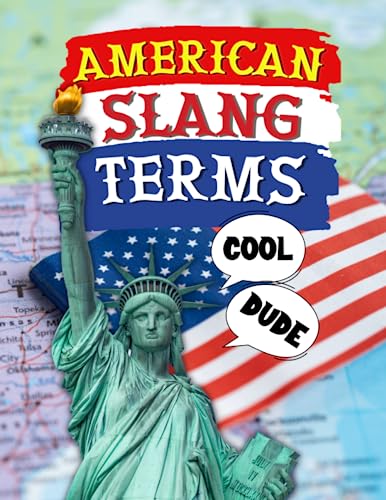

Deja un comentario